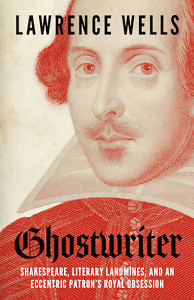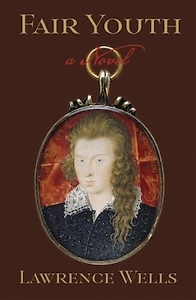Ghosting with Gertrude
Lawrence Wells recalls a tempestuous literary collaboration in Ghostwriter
In Ghostwriter, author and publisher Lawrence Wells describes how, in early 1987, he found himself embarking on an improbable journey. The University of Mississippi approaches him about serving as ghostwriter for a university benefactor who has pledged to fund a performing arts center in return for help with her pet project. Regarding the subject of the book, the vice chancellor for university affairs asks Wells how he feels about the Earl of Oxford, and Wells replies, “You mean Faulkner?” To which the vice chancellor responds with a grin, “No, the other one.”
 The William Faulkner reference is both funny and pertinent, not only because most things in the vicinity of Oxford, Mississippi, eventually tend to circle back to that giant of American letters, but also because Wells was married to Faulkner’s niece and adoptive daughter, Dean Faulkner Wells. Ghostwriter is haunted, in a good way, by both the ghost of Shakespeare (whoever he was) and the spirit of Faulkner, which makes for a predictably winning combination.
The William Faulkner reference is both funny and pertinent, not only because most things in the vicinity of Oxford, Mississippi, eventually tend to circle back to that giant of American letters, but also because Wells was married to Faulkner’s niece and adoptive daughter, Dean Faulkner Wells. Ghostwriter is haunted, in a good way, by both the ghost of Shakespeare (whoever he was) and the spirit of Faulkner, which makes for a predictably winning combination.
The benefactor in question, septuagenarian Gertrude C. Ford (whom Wells refers to as “Mrs. F”) wishes to write a book on the Shakespeare authorship debate, with her beloved Edward de Vere, the 17th Earl of Oxford, featured as the true and indisputable playwright. Wells describes their initial introduction: “’Nice to meet cha, Doctah Wells,’ says Mrs. F. I am the fourth ghostwriter she has hired. As if prepared to be disappointed, she stands sideways in fencing position, one foot pointed at me. En garde! Frizzy hair dyed uniformly brown, mouth a slash of red, she’s Old South aristocracy.”
She’s also petulant, bullying, tantrum-throwing, foul-mouthed, and prone to outlandish demands, but she is deeply passionate about de Vere’s authorship. Wells agrees to write the book, on the condition that it be a novel. Mrs. F reluctantly agrees and proposes the title Shakespeare’s Royal Bastard, because she also believes that de Vere and Queen Elizabeth I had an illegitimate child who grew up to become Henry Wriothesley, the third Earl of Southampton — often suspected to be the “Fair Youth” of Shakespeare’s sonnets. “I want you to make our book as lascivious as it can be!” orders Mrs. F, much to the dismay of Wells.
More than half of Ghostwriter covers a trip to the UK by Wells and his wife. Ostensibly for research, the journey is also an attempt to put some distance between Wells and Mrs. F. The couple visit numerous sites associated with Shakespeare and de Vere — a delightful travelogue punctuated by Mrs. F’s incessant and often irate transatlantic phone calls.
 The “lascivious” book ultimately came to completion under the title Fair Youth and was recently released — with Wells credited as sole author — through Wells’ Yoknapatawpha Press. The novel is a well-executed and entertaining, if wildly improbable, tour of Elizabethan England, notable for its depiction of the often-cruel machinations of the Queen. But Stratfordians will no doubt balk at the portrayal of the Bard of Avon as an illiterate buffoon to whom de Vere pays £1K for his barely competent masquerade and lifelong silence. (Noblemen were forbidden to publish under their own names, and risking the Queen’s displeasure meant risking a lengthy visit to the Tower, with which de Vere was all too familiar.)
The “lascivious” book ultimately came to completion under the title Fair Youth and was recently released — with Wells credited as sole author — through Wells’ Yoknapatawpha Press. The novel is a well-executed and entertaining, if wildly improbable, tour of Elizabethan England, notable for its depiction of the often-cruel machinations of the Queen. But Stratfordians will no doubt balk at the portrayal of the Bard of Avon as an illiterate buffoon to whom de Vere pays £1K for his barely competent masquerade and lifelong silence. (Noblemen were forbidden to publish under their own names, and risking the Queen’s displeasure meant risking a lengthy visit to the Tower, with which de Vere was all too familiar.)
With apologies to Shakespeare and de Vere, however, it is the larger-than-life character of Mrs. F who steals the show in Ghostwriter. To his credit, Wells ultimately realizes that this “adventure of a lifetime” is really about injecting some excitement into the lonely life of an elderly widow. And he admits that “ghosting with Gertrude has been one helluva rollercoaster ride.” Wells’ wild literary joyride is laugh-out-loud funny, surprisingly poignant, and well worth the price of admission. And Wells gives the other Earl of Oxford, in a quote from a 1956 Paris Review interview, the final word on the enduring authorship debate: “[W]hat is important is Hamlet and A Midsummer Night’s Dream, not who wrote them, but that somebody did. The artist is of no importance.”
Ghostwriter: Shakespeare, Literary Landmines and an Eccentric Patron’s Royal Obsession
By Lawrence Wells
The University Press of Mississippi
216 pages
$28Fair Youth
By Lawrence Wells
Sanctuary Editions, an imprint of Yoknapatawpha Press
248 pages
$24.95

Tina Chambers has worked as a technical editor at an engineering firm and as an editorial assistant at Peachtree Publishers, where she worked on books by Erskine Caldwell, Will Campbell, and Ferrol Sams, to name a few. She lives in Chattanooga.


